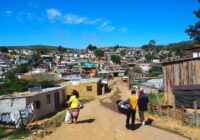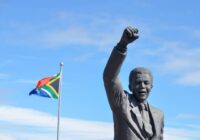South Africa finds itself in uncharted waters as its people contemplate a future without a dominant African National Congress (ANC). This party has steadily thrived since the post-apartheid order. For three decades, the ANC’s electoral dominance and abundance in social capital, which came with being Africa’s oldest liberation movement, combined as a force that permeated almost every public facet of the country. However, for the first time since 1994, the ANC lost its overall majority in the general elections on May 29, and probably for good.
The 2024 edition of the Bertelsmann Transformation Index (BTI), which examines the developments in South Africa up to January 2023, reflects below-50% support for the ruling party in public opinion polls. Referencing grand corruption in the state’s management of public finances and, by extension, its ability to govern effectively, the index notes growing discontent among citizens. Amid ineffective growth, high unemployment and rising levels of poverty, South Africans have steadily lost faith in the once celebrated liberation movement-turned-ruling party over the past decade. The extent of its fall from grace, however, surprised most.
The end of a triumphal era
The ANC’s final election result came in at 40%, on the lower end of the 2024 BTI projections, and marked a 14-point decline from its previous margin in 2019. The official opposition, the center-right Democratic Alliance (DA), remained stagnant at 22%, while the far-left Economic Freedom Fighters (EFF) saw a 1-point decline from 11% to 10%. The newly-formed Umkhonto we Sizwe Party of former President Jacob Zuma managed to garner 15% of the election and became the third largest party in parliament overnight. Although locating itself to the left of the ANC, the party lacks a coherent policy platform. Its campaign largely relies on the charisma of Zuma in the KwaZulu-Natal province, which contributes close to 80% of its votes.
This result obliterated some foundational assumptions that shaped South Africa’s political landscape over the past 30 years. The ANC’s powerful rule and its ability to frame the national discourse led opposition parties and key, societal figures in business, labor and civil society, to align themselves with the party’s positions. For some, this meant developing an identity related to the party or its factions. With such influence, the ANC has increasingly blurred the lines between party and state over the past decade and a half, eventually claiming the center of South African politics. As a result, the recent election has questioned whether the center will hold without its predominant force.
Instability on the horizon
In the short term, the answer is yes. Despite damage from ANC state capture, the executive and legislative arms of the state still function, albeit far from optimally, in executing their respective mandates. As the latest BTI country report on South Africa confirms, the rule of law, underpinned by an independent judiciary, remains supreme; the National Treasury continues to be cautious of populist pressure inside and outside of the ruling party, and an independent Reserve Bank has maintained its resolute stance in protecting the country’s currency. There is also reassurance in the ANC’s graceful acceptance of a devastating election outcome as a fair reflection of the South African people and their will. These are necessary conditions for a stable transition towards a consolidated democracy.
For the long term, a stable center is not guaranteed, requiring focus and commitment to change. Over the past decade and a half, the key metrics for the intractable, interrelated challenges of poverty, inequality and unemployment have all been decreasing. Despite this, pressure and desperation from many South Americans mounted on all arms of the state for a solution. However, a majority of South Africans have recently expressed on the Afrobarometer Survey that the state is failing to react accordingly. In fact, close to two thirds have indicated general dissatisfaction with how the democratic system responds to their needs. A further erosion in trust towards the country’s governance can, therefore, be expected, should the state fail to halt the country’s socio-economic decline. This will have a profound impact on the country’s strategic outlook in the short to medium term.
In light of this dilemma, a cohesive economic strategy for inclusive growth should be developed as the central effort of the new government of national unity (GNU), formed in wake of the election. The idea of a GNU has been broadly welcomed as a noble response when the country remains deeply divided along racial and economic lines. However, a marriage of convenience between ten parties with diverse constituencies also poses obstacles for achieving a consensus. As such, the country’s political landscape is bound to have inevitable bouts of uncertainty and volatility in the coming months. With the 2026 local government elections looming on the horizon, parties of the GNU should take an incentive to create an enabling environment for reform.
This turning point will depend on whether these parties are mature enough to understand the current opportunity, as their predecessors did in 1994 when the country transitioned to democratic rule. Can these parties rise above the acrimonious polarity, devoid of policy substance, that has harmed the most vulnerable for decades? Are these groups able to articulate a shared vision, providing the stability needed to set the country back on a path to prosperity? Their recent track records suggest not. However, this won’t be the first time South Africa has defied the odds.
[Jamie Leung edited this piece.]
The views expressed in this article are the author’s own and do not necessarily reflect Fair Observer’s editorial policy.
Support Fair Observer
We rely on your support for our independence, diversity and quality.
For more than 10 years, Fair Observer has been free, fair and independent. No billionaire owns us, no advertisers control us. We are a reader-supported nonprofit. Unlike many other publications, we keep our content free for readers regardless of where they live or whether they can afford to pay. We have no paywalls and no ads.
In the post-truth era of fake news, echo chambers and filter bubbles, we publish a plurality of perspectives from around the world. Anyone can publish with us, but everyone goes through a rigorous editorial process. So, you get fact-checked, well-reasoned content instead of noise.
We publish 2,500+ voices from 90+ countries. We also conduct education and training programs
on subjects ranging from digital media and journalism to writing and critical thinking. This
doesn’t come cheap. Servers, editors, trainers and web developers cost
money.
Please consider supporting us on a regular basis as a recurring donor or a
sustaining member.
Will you support FO’s journalism?
We rely on your support for our independence, diversity and quality.









Comment